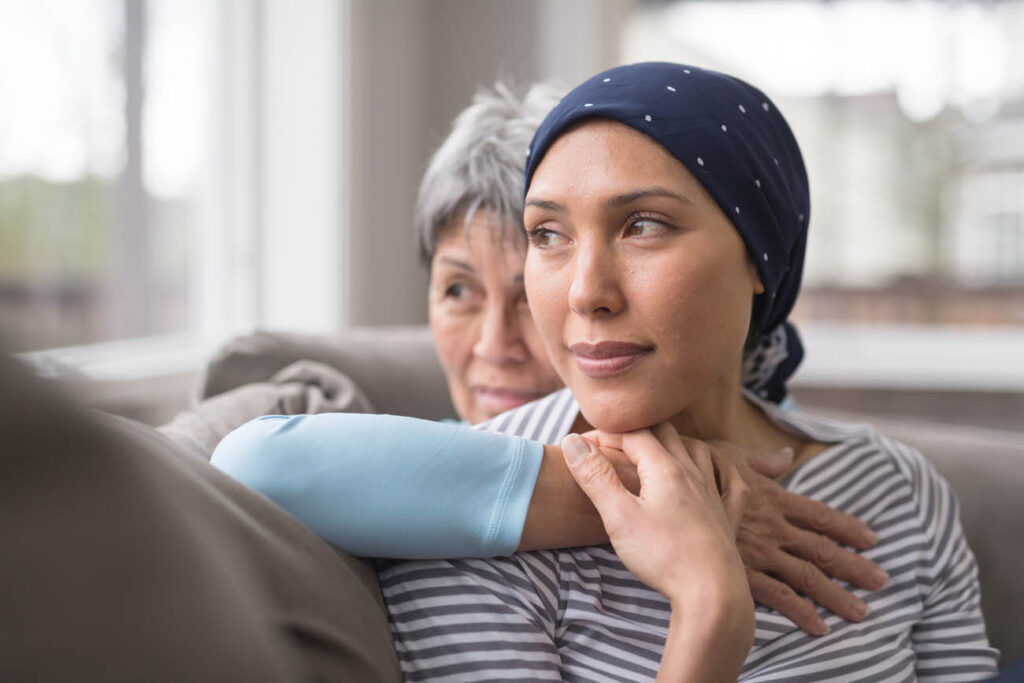Cancer Care Management
When diagnosed with cancer, numerous resources are accessible to offer support, information, and assistance. Obtaining both physical and emotional support with a cancer care manager from H.O.P.E. Helping Our People Everywhere can provide endless benefits.
Receiving a cancer diagnosis can be an emotionally overwhelming experience, but there are essential steps to take if you or someone you know has been diagnosed with cancer. Individuals diagnosed with cancer may become frustrated as they proactively seek out resources online and only become more aggravated with all the treatments and specialists that claim their solution is the best option.
Timely Cancer Treatments with our Solution Based Care Navigator
At H.O.P.E. Helping People Everywhere, our care managements are patient advocates. We are experts when it comes to working with your healthcare team and international and Florida organizations to build a comprehensive support network tailored to each patient’s specific needs. Our care managers embody patience and empathy as we guide individuals through the array of benefits and treatment options available. With a deep understanding of the complexities of healthcare, we approach each interaction with compassion and clarity, ensuring that every individual feels heard and supported. We take the time to thoroughly explain the various treatments, empowering individuals to make informed decisions about their health and well-being. Through our dedication and expertise, our care managers serve as trusted allies on the journey towards improved health and quality of life.
Consult with a Medical Team:
Another benefit of working with H.O.P.E. Helping People Everywhere, is access to groups of healthcare professionals who specialize in treating the specific type of cancer diagnosed, including an oncologist, surgeon, and any other specialists necessary. Additionally, there are also trusted sources of information include websites like the National Cancer Institute (NCI), Cancer.gov, and Cancer.net, offering comprehensive information on various cancer types, treatments, and research.
Ask Questions:
At H.O.P.E. Helping People Everywhere, we encourage questions. Do not hesitate to ask your Care Navigator and/or your medical team questions about your diagnosis, treatment options, and prognosis. It’s crucial to fully comprehend your condition and the recommended treatment plan.
Get a Second Opinion:
If you have any doubts or concerns about the diagnosis or treatment plan, consider seeking a second opinion from another qualified oncologist or medical expert. This can provide additional clarity and confidence in your chosen approach.
Create a Support System:
Share the diagnosis with close family members, friends, and loved ones. They can offer emotional support and help navigate the challenges ahead. Ask about our Cancer Support Groups in your area. Cancer support groups offer emotional support and a platform for sharing experiences with others facing similar diagnoses. They can be in-person or online.
Explore Treatment Options:
Collaborate with your medical team to determine the most appropriate treatment plan, which may include surgery, chemotherapy, radiation therapy, immunotherapy, targeted therapy, or a combination of these treatments.
Home Healthcare Services:
Depending on individual needs, home healthcare services can offer assistance with daily activities, nursing care, and symptom management.
Alternative and Complementary Therapies:
Some individuals explore complementary therapies like acupuncture, massage, or yoga to manage symptoms and enhance their quality of life during cancer treatment.
Learn About Clinical Trials:
In certain cases, clinical trials may be an option to explore. These trials assess new treatments and therapies and can provide access to cutting-edge medical advancements. Clinical trials provide access to advanced treatments and therapies. Patients can inquire about available trials through healthcare providers or organizations like the NCI.
Manage Symptoms:
Cancer and its treatments can lead to various symptoms and side effects. Discuss symptom management strategies with your medical team, and promptly seek assistance if you experience discomfort or pain.
Consider a Care Coordinator:
A patient navigator or care coordinator like H.O.P.E. Care Management can help coordinate your healthcare, schedule appointments, and address non-medical needs such as transportation and support services.
Emotional Support:
Coping with cancer can be emotionally challenging. H.O.P.E, Helping Our People Everywhere helps patient seek support from a therapist, counselor, or join a cancer support group to connect with others who understand your experience. Be sure to contact us to assist with emotional and practical challenges, such as coping with the emotional impact of cancer, financial issues, and connecting with support services.
Nutrition and Lifestyle:
Maintaining a healthy lifestyle, including a balanced diet and regular exercise, can support your overall well-being during cancer treatment. Registered oncology dietitians or nutritionists provide guidance on maintaining a healthy diet during cancer treatment, addressing issues such as appetite loss and managing treatment-related side effects. H.O.P.E, Helping Our People Everywhere helps patient consult with a registered oncology dietitian for nutrition guidance and other medical specialists.
Alternative and Complementary Therapies:
Some individuals explore complementary therapies like acupuncture, massage, or yoga to manage symptoms and enhance quality of life during cancer treatment.
Explore Financial Assistance:
H.O.P.E, Helping Our People Everywhere, helps patient investigate financial resources and assistance programs that may alleviate the financial burden of cancer treatment, medication costs, and related expenses via Financial Assistance Programs. There are many cancer organizations and foundations which provide financial assistance to help cover medical expenses, transportation costs, and related financial burdens. Entities like the American Cancer Society (ACS), CancerCare, and Livestrong offer a wide range of resources, including information, financial assistance, and support services.
Legal and Employment Matters:
Understand your rights in the workplace and consider discussing your diagnosis with your employer. Legal assistance may be needed, especially regarding disability benefits. Legal services and patient advocacy organizations assist patients in navigating insurance coverage, employment rights, and legal matters related to their cancer diagnosis.
Transportation Services:
Certain organizations offer transportation assistance to help patients access medical appointments, particularly if they face mobility or transportation challenges.
Counseling and Psychosocial Support:
Licensed therapists and counselors provide emotional support and coping strategies to help patients and their families manage the psychological impact of cancer.
Advance Directives:
Consider establishing advance directives, like a living will and healthcare proxy, to outline your healthcare preferences in case you cannot make decisions for yourself.
Maintain Open Communication:
Keep communication channels open with your healthcare team throughout your treatment journey. Regularly update them on your symptoms and any concerns.
Stay Informed:
Educate yourself about your specific type of cancer and stay up-to-date with the latest research, treatments, and developments. Knowledge can empower you to actively participate in your care.



